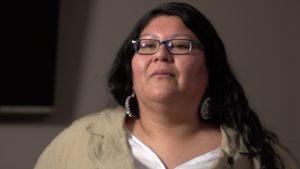Year: 2015
Location: Fort McMurray
Profile: Angela Fiddler grew up on two reserves in northern Saskatchewan and is a registered member of Waterhen Cree Nation. Like her parents, she attended residential school and then worked a number of minimum-wage jobs in towns in the region. The mother of six children, she decided to seek work in oilfield work camps near Fort McMurray in 2010 so that she could earn a better income to support her children. Her ex-husband agreed to provide childcare back home and involved the children in sports. After cleaning dishes for 10 months, she began working in the dining room. Conflict with one of her dining room supervisors led her to become active in her union, UFCW, Local 401, which joined her in talks with management that led to her work being reassigned to housekeeping.
Once she was active in the union, Fiddler became a shop steward and fought for the right of Indigenous workers to be provided with a teepee in camps where they could conduct their spiritual activities, and for a stove to warm the teepee. Asked by the UFCW to serve on a negotiating team, she persuaded management to pay Indigenous workers for a day off when they celebrated Aboriginal Day. Fiddler’s interview describes the difficulties of life on a remote reserve with few employment possibilities. She notes the racism that she and others have encountered from some non-Indigenous camp supervisors and workers and the ways in which she and the union have responded to such racism. Fiddler also reflects on the impacts of the oilsands on Indigenous communities.
Keywords: Camps, work/industrial; Childcare for working mothers; Cree people; Fort McMurray; Housekeeping work; Indigenous participation in unions; Indigenous spirituality and unions; Indigenous workers; Indigenous women workers; Oilfield camps; Oilsands and Indigenous people; Racism towards Indigenous workers; UFCW, Local 401
Transcript: Download PDF
See also: Indigenous Labour in Alberta; Systemic Racism in Alberta; United Food and Commercial Workers; Women and Work in Alberta

